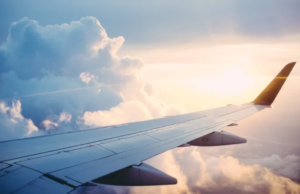Welcome aboard, fellow travelers. We’ve all experienced the frustration and disappointment of a flight cancellation. Whether you’re jetting off to an exotic destination or heading home after a whirlwind adventure, there’s nothing more disheartening than having your plans derailed by unforeseen circumstances. But fear not, dear readers. In this blog post, we will delve into the most common reasons behind flight cancellations. But if you want to get your flight compensated, you should download the top flight compensation apps. So fasten your seatbelts and prepare for takeoff as we explore the turbulent world of travel disruptions.
Adverse Weather Conditions
 Mother Nature can be a force to be reckoned with, and when it comes to flight cancellations, adverse weather conditions often take center stage. From thunderstorms and blizzards to hurricanes and foggy conditions, unpredictable weather can wreak havoc on travel plans. Imagine sitting at the airport, excitement building as you prepare for your long-awaited getaway. Suddenly, an announcement crackles over the speakers:
Mother Nature can be a force to be reckoned with, and when it comes to flight cancellations, adverse weather conditions often take center stage. From thunderstorms and blizzards to hurricanes and foggy conditions, unpredictable weather can wreak havoc on travel plans. Imagine sitting at the airport, excitement building as you prepare for your long-awaited getaway. Suddenly, an announcement crackles over the speakers:
“Due to inclement weather in the area, Flight XYZ has been canceled.” Disappointment washes over you like a sudden downpour. Adverse weather conditions pose significant risks to air travel. Strong winds can make it unsafe for planes to take off or land smoothly.
Air Traffic Congestion
One of the most frustrating reasons for flight cancellations is air traffic congestion. Picture this: you’re all packed and ready to jet off on your dream vacation, only to find out that your flight has been canceled due to heavy air traffic. It’s enough to make anyone want to pull their hair out. But why does air traffic congestion happen? Well, it’s simple – there are just too many planes in the sky at once. With more people than ever choosing air travel as their preferred mode of transportation, airports are becoming increasingly crowded. When airports become overcrowded, it can lead to delays and even cancellations.
Mechanical Issues
When it comes to flight cancellations, one of the most common culprits is mechanical issues. These can range from minor glitches to major malfunctions that require extensive repairs. Regardless of the severity, any aircraft mechanics issue can result in a canceled flight. The safety and security of passengers are always the top priorities for airlines, so if there is even a slight concern about the plane’s functionality, they will not hesitate to cancel the flight. This ensures that any potential risks or dangers are avoided. Mechanical issues can include engine problems, landing gear, electrical systems, or even simple things like broken seats or malfunctioning lavatories. While some issues may be discovered during routine maintenance checks before boarding, others may arise unexpectedly while the plane is already operating.
Crew Unavailability
 Crew Unavailability can be a frustrating and unexpected reason for flight cancellations. Airlines rely on their crew members to ensure the safe and efficient operation of flights, so when there is a shortage or unavailability of crew members, it can disrupt travel plans for passengers. Various factors can contribute to crew unavailability. One common reason is illness or injury among the crew.
Crew Unavailability can be a frustrating and unexpected reason for flight cancellations. Airlines rely on their crew members to ensure the safe and efficient operation of flights, so when there is a shortage or unavailability of crew members, it can disrupt travel plans for passengers. Various factors can contribute to crew unavailability. One common reason is illness or injury among the crew.
Just like anyone else, flight attendants and pilots can fall ill or get injured, rendering them unable to perform their duties. In such cases, airlines must cancel the affected flights until they can find replacement personnel. Another factor that may lead to crew unavailability is scheduling conflicts.
While these reasons may seem frustrating at first glance, when facing a canceled flight situation, remember that airline companies prioritize passenger safety above all else. They strive hard every day under unprecedented challenges to maintain schedules and get passengers safely from one destination to another. Understanding these common reasons behind flight cancellations helps us appreciate the efforts made by airlines to ensure our travel experiences remain safe even during uncertain times.




 Honeymoons were a given. If you wanted to and were lucky enough to go to a tropical paradise or mountaintop hotel, you could do it after your wedding day. But today, after spending weeks cooped up, a visit to a tropical island with a sour drink in hand sounds like heaven. Once you get back to normal, there will be a new appreciation for these “little things.” Flying on a plane, going out to dinner, never wearing a mask all the time – these things will be appreciated on a whole new level if the pandemic sustains us.
Honeymoons were a given. If you wanted to and were lucky enough to go to a tropical paradise or mountaintop hotel, you could do it after your wedding day. But today, after spending weeks cooped up, a visit to a tropical island with a sour drink in hand sounds like heaven. Once you get back to normal, there will be a new appreciation for these “little things.” Flying on a plane, going out to dinner, never wearing a mask all the time – these things will be appreciated on a whole new level if the pandemic sustains us.
 Another reason street art is fascinating is that people can interpret it in so many ways. Unlike traditional art forms, street art is not always easy to understand. It is part of the appeal for many people. They enjoy figuring out the meaning behind a mural or piece of graffiti.
Another reason street art is fascinating is that people can interpret it in so many ways. Unlike traditional art forms, street art is not always easy to understand. It is part of the appeal for many people. They enjoy figuring out the meaning behind a mural or piece of graffiti.
 It is important to consider how many people will be sleeping in your
It is important to consider how many people will be sleeping in your 
 This is the most important question. You have to consider the cost of a new car to tow, although some can cost more than $100,000. Class B motorhomes can cost between $50,000 and $80,000, while Class A motorhomes can cost between $200,000 and $300,000. Costs vary depending on whether the RV is new or used. You can do some research if you want to know the different prices of it. Some owners tend to go over the budget when buying an RV.
This is the most important question. You have to consider the cost of a new car to tow, although some can cost more than $100,000. Class B motorhomes can cost between $50,000 and $80,000, while Class A motorhomes can cost between $200,000 and $300,000. Costs vary depending on whether the RV is new or used. You can do some research if you want to know the different prices of it. Some owners tend to go over the budget when buying an RV.